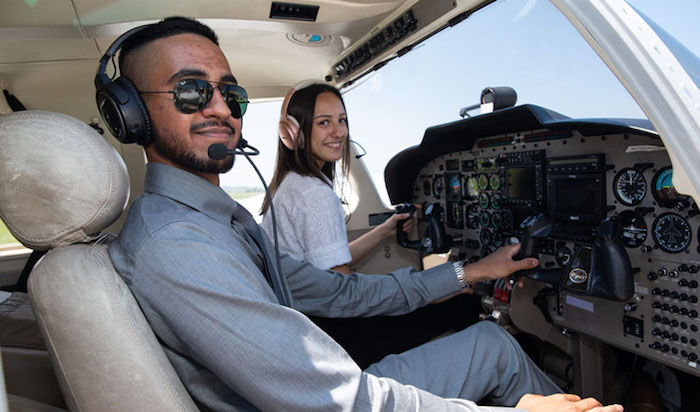Alberta
Province announces $11 million investment to train Albertans to work in aviation industry

Helping Alberta become Canada’s next aviation hub
The Ministry of Advanced Education is supporting Alberta’s growing aviation industry by investing more than $11 million over three years in Budget 2023.
Alberta continues to be the economic engine of Canada, and Alberta’s government is focused on even more job creation and diversification. Last fall, Alberta’s government signed a memorandum of understanding with WestJet Airlines, recognizing the importance of Alberta’s aviation industry and its contributions to the economy.
Part of the framework of the MOU included a commitment to address critical skilled labour shortages currently faced by the aviation industry. Alberta is home to the second-largest Canadian airline, which operates almost 800 flights carrying 70,000 passengers daily. These numbers are expected to double over the coming years.
That’s why Alberta’s government is committed to growing and diversifying its aerospace, aviation and logistics sectors. This new investment of $11 million includes:
- $6 million over three years to help Mount Royal University establish a bachelor of aviation management program
- $4.5 million over three years for an air access bursary for students in high-demand aviation programs
- $500,000 to support planning of an aviation centre of excellence
“These investments will help ensure Alberta’s air industry has the resources and workforce it needs to succeed, further supporting the growth and vitality of Alberta’s aviation industry, the diversifying of our economy and leading more students to successful careers.”
Supporting new seats in aviation education
Mount Royal University’s bachelor of aviation management program will add 120 seats over four years and be the first of its kind in Alberta. Unlike the aviation diploma, students seeking admission do not have to have a private pilot’s licence.
“We thank the Government of Alberta for this support of Mount Royal’s aviation program and the future pilots it educates. With the demand for pilots continuing to grow, this announcement speaks to the strength of the program, the vital role of education in advancing the aviation sector and its importance to the economy of Alberta.”
Tim Rahilly, president and vice-chancellor, Mount Royal University
The proposed program is a standard 120-credit degree. While there is only a generalized major, aviation management, the institution is offering the program with two different six-course concentrations.
One concentration in flight crew operations offers a commercial pilot and multi-engine instrument rating course to prepare students for a role as a pilot as well as other courses designed to prepare them for management opportunities as their flying career develops. The other concentration in aviation operations focuses on a greater development of management skills and specific aviation business content.
New bursary for aviation students
The new air access bursary provides $10,000 in non-repayable support for aviation students at Alberta post-secondary institutions. A total of $4.5 million will support up to 450 students over three years.
“Aviation is a growing field and the demand for pilots continues to soar. We thank the Government of Alberta for their financial support for students like me in the aviation program at Mount Royal University.”
Creating a hub for excellence
Alberta’s government is working across multiple ministries to support its air access expansion strategy as part of the memorandum of understanding with WestJet Airlines. Through this strategy, Alberta’s government is looking to boost the provincial economy by more than 1,000 direct jobs in Alberta and tens of thousands of other new jobs and billions in new economic activity. Pending approval, $500,000 will support planning for the centre of excellence for aviation training.
“The memorandum of understanding between the Government of Alberta and WestJet sets a foundation to support aviation-related post-secondary programs and improve skilled labour in the industry. This announcement strengthens these commitments and WestJet applauds the Government of Alberta for this funding that will further support WestJet’s Center of Excellence for advanced aviation training right here in Alberta.”
Alberta is proving to be Canada’s next aviation hub and Alberta’s government continues to build and create new partnerships with the aviation industry and Alberta’s post-secondary institutions. Another key partnership in the province’s aviation industry exists between De Havilland and SAIT, focusing on aircraft manufacturing.
“This investment in critical skills and training comes at a time when our company is actively growing our Alberta footprint to advance our mission of manufacturing great Canadian aircraft that serve communities, transport passengers and save lives around the world. We look forward to continuing to work with the Government of Alberta to ensure we have the trained staff we need to deliver a new aerospace sector in the province.”
Budget 2023 secures Alberta’s future by transforming the health-care system to meet people’s needs, supporting Albertans with the high cost of living, keeping our communities safe and driving the economy with more jobs, quality education and continued diversification.
Quick facts
- Alberta’s aviation, aerospace and logistics industries employ more than 75,000 people (2021, Statistics Canada).
- This investment expands on the October 2022 announcement that invested more than $8 million over three years to expand several key facilities and added 40 seats per year to Mount Royal University’s aviation diploma program.
- A 2018 report from the Canadian Council for Aviation and Aerospace found that Canada’s aviation industry will need as many as 7,300 more pilots by 2025.
Alberta
Red Deer Justice Centre Grand Opening: Building access to justice for Albertans

The new Red Deer Justice Centre will help Albertans resolve their legal matters faster.
Albertans deserve to have access to a fair, accessible and transparent justice system. Modernizing Alberta’s courthouse infrastructure will help make sure Alberta’s justice system runs efficiently and meets the needs of the province’s growing population.
Alberta’s government has invested $191 million to build the new Red Deer Justice Centre, increasing the number of courtrooms from eight to 12, allowing more cases to be heard at one time.
“Modern, accessible courthouses and streamlined services not only strengthen our justice
system – they build safer, stronger communities across the province. Investing in the new Red Deer Justice Centre is vital to helping our justice system operate more efficiently, and will give people in Red Deer and across central Alberta better access to justice.”

Government of Alberta and Judiciary representatives with special guests at the Red Deer Justice Centre plaque unveiling event April 22, 2025.
On March 3, all court services in Red Deer began operating out of the new justice centre. The new justice centre has 12 courtrooms fully built and equipped with video-conference equipment to allow witnesses to attend remotely if they cannot travel, and vulnerable witnesses to testify from outside the courtroom.
The new justice centre also has spaces for people taking alternative approaches to the traditional courtroom trial process, with the three new suites for judicial dispute resolution services, a specific suite for other dispute resolution services, such as family mediation and civil mediation, and a new Indigenous courtroom with dedicated venting for smudging purposes.
“We are very excited about this new courthouse for central Alberta. Investing in the places where people seek justice shows respect for the rights of all Albertans. The Red Deer Justice Centre fills a significant infrastructure need for this rapidly growing part of the province. It is also an important symbol of the rule of law, meaning that none of us are above the law, and there is an independent judiciary to decide disputes. This is essential for a healthy functioning democracy.”
“Public safety and access to justice go hand in hand. With this investment in the new Red Deer Justice Centre, Alberta’s government is ensuring that communities are safer, legal matters are resolved more efficiently and all Albertans get the support they need.”
“This state-of-the-art facility will serve the people of Red Deer and surrounding communities for generations. Our team at Infrastructure is incredibly proud of the work done to plan, design and build this project. I want to thank everyone, at all levels, who helped make this project a reality.”
Budget 2025 is meeting the challenge faced by Alberta with continued investments in education and health, lower taxes for families and a focus on the economy.

Quick facts
- The new Red Deer Justice Centre is 312,000 sq ft (29,000 m2). (The old courthouse is 98,780 sq ft (9,177 m2)).
- The approved project funding for the Red Deer Justice Centre is about $191 million.
Alberta
Made in Alberta! Province makes it easier to support local products with Buy Local program

Show your Alberta side. Buy Local. |
When the going gets tough, Albertans stick together. That’s why Alberta’s government is launching a new campaign to benefit hard-working Albertans.
Global uncertainty is threatening the livelihoods of hard-working Alberta farmers, ranchers, processors and their families. The ‘Buy Local’ campaign, recently launched by Alberta’s government, encourages consumers to eat, drink and buy local to show our unified support for the province’s agriculture and food industry.
The government’s ‘Buy Local’ campaign encourages consumers to buy products from Alberta’s hard-working farmers, ranchers and food processors that produce safe, nutritious food for Albertans, Canadians and the world.
“It’s time to let these hard-working Albertans know we have their back. Now, more than ever, we need to shop local and buy made-in-Alberta products. The next time you are grocery shopping or go out for dinner or a drink with your friends or family, support local to demonstrate your Alberta pride. We are pleased tariffs don’t impact the ag industry right now and will keep advocating for our ag industry.”
Alberta’s government supports consumer choice. We are providing tools to help folks easily identify Alberta- and Canadian-made foods and products. Choosing local products keeps Albertans’ hard-earned dollars in our province. Whether it is farm-fresh vegetables, potatoes, honey, craft beer, frozen food or our world-renowned beef, Alberta has an abundance of fresh foods produced right on our doorstep.
Quick facts
- This summer, Albertans can support local at more than 150 farmers’ markets across the province and meet the folks who make, bake and grow our food.
- In March 2023, the Alberta government launched the ‘Made in Alberta’ voluntary food and beverage labelling program to support local agriculture and food sectors.
- Through direct connections with processors, the program has created the momentum to continue expanding consumer awareness about the ‘Made in Alberta’ label to help shoppers quickly identify foods and beverages produced in our province.
- Made in Alberta product catalogue website
Related information
-

 Business2 days ago
Business2 days agoIs Government Inflation Reporting Accurate?
-

 2025 Federal Election2 days ago
2025 Federal Election2 days agoCarney’s Hidden Climate Finance Agenda
-

 2025 Federal Election2 days ago
2025 Federal Election2 days agoWhen it comes to pipelines, Carney’s words flow both ways
-

 2025 Federal Election2 days ago
2025 Federal Election2 days agoStudy links B.C.’s drug policies to more overdoses, but researchers urge caution
-

 2025 Federal Election1 day ago
2025 Federal Election1 day agoPolls say Canadians will give Trump what he wants, a Carney victory.
-

 2025 Federal Election1 day ago
2025 Federal Election1 day agoCarney Liberals pledge to follow ‘gender-based goals analysis’ in all government policy
-

 2025 Federal Election1 day ago
2025 Federal Election1 day agoPoilievre’s Conservatives promise to repeal policy allowing male criminals in female jails
-

 Also Interesting2 days ago
Also Interesting2 days agoIf You Frequently Travel, A Second Phone Number Can Be A Cost Effective Solution




